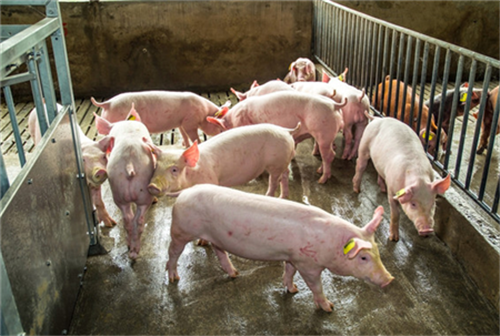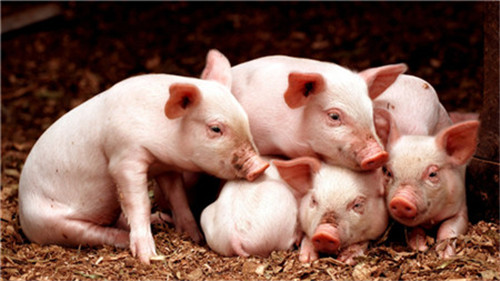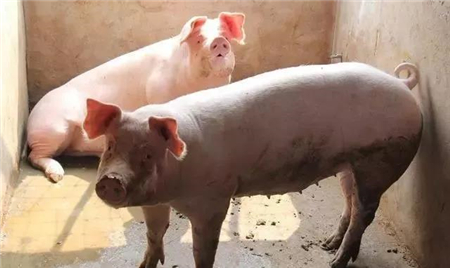Attenuation Law and reference immune Age of Maternal Antibody in Piglet
Maternal antibodies of piglets have a natural protective effect on pre-weaned piglets. however, maternal antibodies drop sharply until they disappear 1-2 weeks after weaning, and their own immune system and acquired immunity are not fully established. therefore, it is easy to infect diseases during the immune blank period. the following is a brief discussion on the growth and decline of maternal antibodies in several major viral infectious diseases. In order to provide support for vaccine immunization and related disease prevention and control.
I. the growth and decline of maternal antibodies against classical swine fever.
Classical swine fever is an acute, febrile and highly contagious disease caused by classical swine fever virus. The data showed that the 0-day-old piglets maintained colostrum had no swine fever maternal antibodies, and the swine fever maternal antibodies of 1-day-old piglets reached the peak, and then decreased gradually; classical swine fever maternal antibodies protected 1-28-day-old piglets, and a small number of pigs were protected at 35 days old, however, the existence of maternal antibodies is also an important factor leading to the poor immune effect of piglets classical swine fever vaccine, so it is very important to determine the correct first immunization age. Through the experiment, the piglets should be immunized for the first time at the age of 28-35 days, which can obtain a more qualified immune protection rate, which is an important guarantee for piglets to avoid the occurrence of classical swine fever in the conservation stage, and at the same time do a good job in the monitoring of swine fever antibody.
2. The growth and decline of maternal antibodies against circovirus.
The research data of Zhang Yi et al. (2012) showed that the maternal antibodies of newborn piglets were detected by prenatal immunization with circovirus vaccine. the maternal antibodies of newborn piglets almost could not be detected before lactation and increased gradually after sucking colostrum. The maternal antibody level was the highest at 10-20 days old and reached the peak at 20 days old, decreased rapidly after 30 days old, and decreased to the critical value at about 40 days old. Therefore, it is the best to vaccinate circovirus at the age of 14-20 days. Higher maternal antibody level of suckling piglets can reduce the occurrence of PCV2 viremia in serum, thus inhibit the replication of PCV2 in the body, protect piglets from PCV2 infection in the early stage, and reduce the number of viruses in feces, serum and immune organs of piglets. After sows were vaccinated with PCV2 vaccine, the infection of the virus to piglets decreased, but it did not mean that the whole piglet herd was completely protected. In order for piglets to be completely protected, piglets must be immunized with circovirus vaccine. Foreign studies have confirmed that the low intake of early colostrum is a major factor leading to weaning piglet syndrome. Therefore, in the production practice, scientifically vaccinating sows and piglets with circovirus vaccine to ensure that newborn piglets eat enough colostrum in time is the key to ensure that piglets have good immunity.

Third, the growth and decline of maternal antibodies in blue ear disease.
Porcine blue ear disease is a common infection and continuous loss disease in pig farms at present, and the immune procedure is very important. The study of du Xizhong et al. (2012) showed that the maternal antibody against blue ear disease began to decrease sharply at the age of 21 days, with a half-life of about 9 days, and basically decreased to the critical value before and after weaning. The results of Han Xiangui (2011) showed that the immune effect of 14-21 days old was the best through the detection of live vaccine against blue ear disease at the age of 14, 21 and 28 days. According to the growth and decline law of maternal antibody against blue-ear disease, the specific antibody dependence enhancement (ADE) of blue-ear disease virus and the slow production of neutralizing antibody against live blue-ear disease vaccine, the live vaccine for blue-ear disease should be immunized sooner rather than later, and it is suggested that the live vaccine should be immunized at the age of 14-21 days. at the same time, we should monitor the antibody of blue-ear disease virus in sows and the stability of blue-ear disease in commercial pigs.
Fourth, the growth and decline of maternal antibodies to pseudorabies.
Pseudorabies is a disease that will seriously affect the economic benefits of commercial pigs in pig farms, so the prevention and control of pseudorabies must be strengthened. First of all, it is necessary to understand the changes of maternal antibodies against pseudorabies. According to the study of du Xizhong et al. (2012), sows immunized 30 days before delivery can make piglets get higher maternal antibodies, but the protection period of pseudorabies vaccine on the market at present is 4-5 months, so it is recommended that sows should be immunized 3 times per year. The maternal antibody of piglets began to decrease with the increase of age, and the positive rate of antibody decreased from 100% at 4 weeks to 54.55% at 10 weeks, with the fastest decline at the age of 6-8 weeks. The study of du Xizhong et al (2012) also showed that the positive rate and S / N ratio of pseudorabies virus gB antibody decreased in piglets immunized before 5 weeks of age, indicating that maternal antibodies may inhibit the establishment of active immunity of piglets, and the antibody level after neutralizing maternal antibodies against vaccine antigen was lower than that of maternal antibodies in the same period. Therefore, in the design of the immunization program of pseudorabies vaccine, it is the key to overcome the inhibition of maternal antibodies obtained by passive immunization on the active immunity of piglets. It is suggested that the first immune age of pseudorabies in piglets should be 6-8 weeks old. According to the detection of pig farms in 2012, it is found that the antibody to pseudorabies virus in fat pigs about 120 days old is basically zero, and it is recommended to strengthen the vaccination of pseudorabies vaccine in 10-12 weeks.
5. The growth and decline of maternal antibodies to foot-and-mouth disease.
Foot-and-mouth disease is a severe infectious disease characterized by vesicular lesions. The results of Yu Qiong et al. (2012) showed that there was no maternal antibody in 0-day-old piglets without colostrum, and the maternal antibody titer of 1-day-old piglets reached the peak, then decreased gradually, and foot-and-mouth disease maternal antibody protected 1-14-day-old piglets. some piglets are protected at 21 days of age. At the age of 28035 days old, the qualified rate of immune antibody is lower than 70% 21 days after the first immunization, and reaches a peak of 86.7% after 28 days. If the immune antibody is exempted again one month later, the level of effective immune antibody can be maintained for a long time, then gradually decreased, and can no longer be protected after 5 months. The study of Zeng Cunfang et al (2010) suggested that fattening pigs about 120 days old should be immunized with foot-and-mouth disease once to ensure the immune effect of foot-and-mouth disease.
Related
- On the eggshell is a badge full of pride. British Poultry Egg Market and Consumer observation
- British study: 72% of Britons are willing to buy native eggs raised by insects
- Guidelines for friendly egg production revised the increase of space in chicken sheds can not be forced to change feathers and lay eggs.
- Risk of delay in customs clearance Australia suspends lobster exports to China
- Pig semen-the Vector of virus Transmission (4)
- Pig semen-the Vector of virus Transmission (3)
- Five common causes of difficult control of classical swine fever in clinic and their countermeasures
- Foot-and-mouth disease is the most effective way to prevent it!
- PED is the number one killer of piglets and has to be guarded against in autumn and winter.
- What is "yellow fat pig"? Have you ever heard the pig collector talk about "yellow fat pig"?



